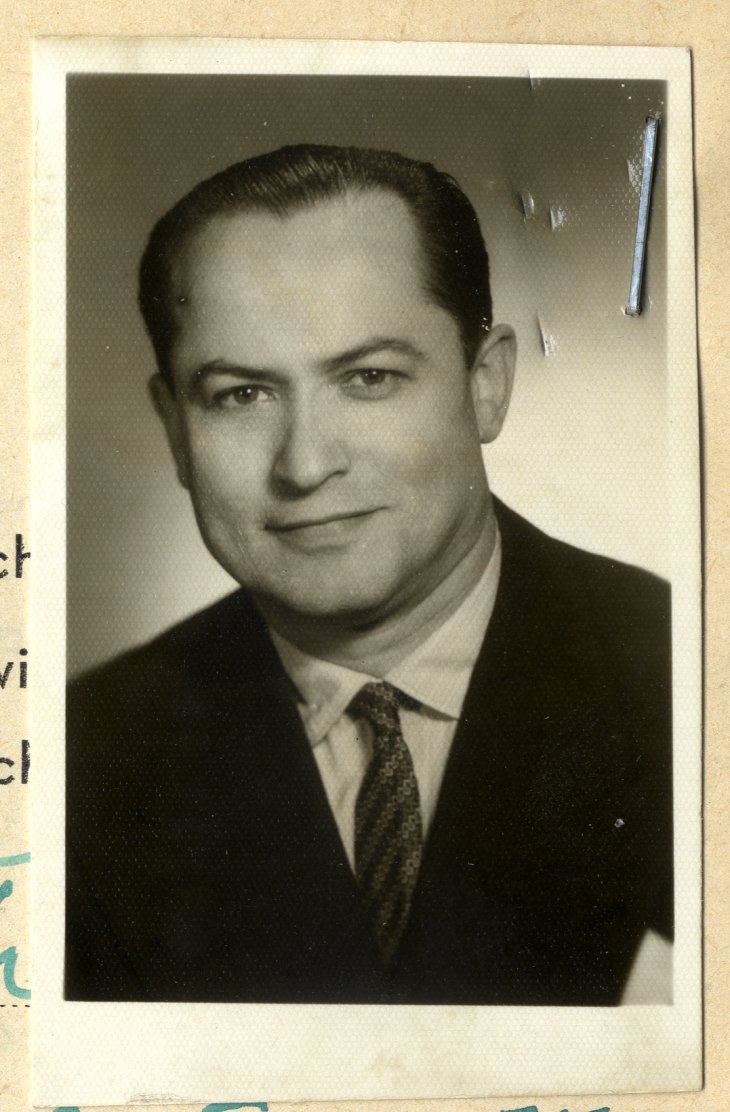
Marek Thee as head of Polish Consulate General in Tel Aviv in 1950–1952. Photo: Ministry of Foreign Affairs Republic of Poland Archives
Marek Thee (1918–1999), a portrait written by Marta Bivand Erdal
The opposite pole of globalisation is fragmentation – the exclusion of a majority of the world’s population from the benefits of human development, generating a frustrated drive to defensive postures in violent and suicidal ideologies of nationalism, ethnicity and political-religious fundamentalism. Fault-lines are erected across the globe both vertically and horizontally by economic and military power relations on the one hand, and by gross inequalities between the rich and the poor on the other hand. (Marek Thee, personal, unpublished memoirs)[1]
In his personal and unpublished memoirs My Story: A Journey Through the 20th Century, Marek Thee, in the late 1990s, soon before his death in 1999, reflects on the state of the world. He does so as a child of twentieth century Europe, but also to a significant extent as a child of the twentieth century world. His twentieth century perspective, as a historian by discipline, and a truth-seeking activist at heart, are strikingly accurate comments on the present, some twenty years after they were written.[2]
A professor of history from Warsaw, Poland, interested in international relations and peace, with diplomatic experience from both the Middle East and Indochina, Marek Thee arrived at PRIO in 1968. Marek Thee may not appear to be the typical ‘PRIOite’ of the 1960s, yet the impact of the Second World War on his life – on him – is something he shares with several other early PRIOites. He also shared with his fellow PRIOites a dedication to the possibility of peace, and a sense of activism that must have been an underlying impetus for him, driving him to work incredibly hard throughout his life, prior to and during his time at PRIO, as well as afterward.
Marek Thee would work at PRIO for some twenty years, not least as editor of the Bulletin of Peace Proposals (later renamed Security Dialogue), briefly as Director (1981–1983), and as a researcher. He was just past his fiftieth birthday when he moved to Oslo, Norway, with his wife, Erna, and their two daughters, young women at the time, Maya and Halina. The following is the story of the human being Marek Thee, formative of the activist and the diplomat, the father and husband, the idealist and the researcher. In the words of Asbjørn Eide in the obituary he wrote for his close friend and long-time colleague, at PRIO and later at the Norwegian Centre for Human Rights:
‘Marek Thee was a rare case of a person who, even in the most desperately difficult circumstances and in the face of severe adversity, managed to channel his intellect and analytical skill towards constructing solutions to the world’s conflicts and tensions.’
From childhood in small-town Poland to youth activist in Gdańsk [Danzig] (1918–1938)
Marek Thee was born on 21 November 1918 in Rzeszów in what today is south-east Poland, about 150km east of Kraków, in the region of Galicia, which was formerly a part of the Austro-Hungarian empire. In Marek’s early childhood, he was surrounded by his father, mother, and an older brother. When describing his family’s material circumstances, Marek himself writes: ‘My family was of lower merchant middle class which had to work hard for their livelihood. (…) The range of ideas at home was almost limited to prayers for being better off’ (personal, unpublished memoirs). When Marek was around 8 years old, his mother died. Not long after, his father remarried and then Marek’s two younger sisters were born, Paulina and Halina. Later, Marek named his own daughter Halina, in remembrance of his youngest little sister.
Late in the 1920s, the whole family relocated from Rzeszów – a town with 23,700 inhabitants in 1910, and with nearly half the inhabitants in 1911 being Jews – to Gdańsk [the Free City of Danzig], on the southern coast of the Baltic Sea. Marek’s father owned a small factory and a shop there. The family lived in Sopot [Zoppot], a town with over 30,000 inhabitants in the territory of Danzig. The family business was on a street that in the 1930s was named Adolf Hitler-Straße. The ever-changing names of that street reflected the times. In the post-war period it was Stalin’s Avenue, while today it is Independence Avenue, the main thoroughfare connecting the three cities now named Gdynia, Gdańsk, and Sopot.
The shop where their produce was sold was in the heart of the old city, now the tourist district of Gdańsk. The family lived in an apartment on the second floor, in a building which is still standing in Sopot. Marek went to school and was a pupil at the Polish upper secondary school. Even after the Second World War, he maintained some contact with friends from his school days.
In 2019, I had an informal interview in Oslo with Marek’s youngest daughter, Halina Thee, on the subject of her father’s life. During the conversation, I return to the Rzeszów days and ask her: why did Marek and the family move to Gdańsk [Danzig]?
The Jews in Galicia experienced persecution in the time before the First World War and also in the aftermath of the Russian revolution, the Civil War and Polish–Bolshevik war in 1920. The Free City of Danzig came into existence in 1920 as a result of the Treaty of Versailles following the First World War and was later subsumed by Germany in 1939, following its invasion of Poland. The city is referred to as Danzig in German; in Polish, it is referred to as Gdańsk, and at the time as Wolne Miasto Gdańsk [the Free City of Danzig].
The Free City, a port administered by the League of Nations, was an attractive emigration destination for the Jewish middle classes until the Nazi Party won power in Danzig in 1935. Already while at school in Gdańsk [Danzig], Marek started to take an interest in the idea of a better society, of a brighter future.
He became an activist and joined the Hashomer Hatzair, a Socialist-Zionist youth movement (which still exists to this day). He also became a youth member of the communist party. As a pupil he could cross the border to Poland regularly, and he used to carry leaflets across the border, an activity that the Polish authorities would probably have described as smuggling. He completed upper secondary school in Gdańsk [Danzig].
According to Nils Petter Gleditsch, a researcher who worked alongside Marek at PRIO from his arrival in the late 60s, in Marek’s account of events, he underscored the possibility that he had lost his citizenship due to his communist activism.
So, Marek a young man of barely twenty years, was left alone. Stateless. He was trapped. What is mysterious is how he got himself onto a list of people who managed to escape from Gdańsk. But he did, and left Europe for Palestine, aboard a ship.
A refugee’s journey across the Mediterranean (6 March 1939-28 June 1939)
About five hundred Jews from Gdańsk, plus some more they picked up on the way, boarded the ship and sailed via the Black Sea to Istanbul in Turkey and to the Mediterranean […] That reminds me of something, you know? It’s exactly what is happening now.
From stateless refugee to Polish diplomat in Israel (1939–1952)
As a 20-year old man, Marek Thee landed in Palestine and got himself a job working in a brush factory. Somehow, he had his birth certificate and his upper secondary school diploma, probably having sent it to his relatives before leaving Gdańsk [Danzig]. In Palestine, it did not take long until Marek got involved in a communist movement. He was engaged in producing leaflets and taught himself Hebrew as well as letterpress printing, a technique needed for his illegal printing activity.
On two instances Marek was jailed, officially for reasons related to the theft of paper, rather than subversive political activities, as it made it less complicated for the British police. Soon, though, the Second World War began to draw closer. By March 1942, Władysław Anders, commanding officer of the Polish army in the Middle East, arrived in Palestine with Polish troops.
This was the result of British-Soviet-Polish arrangement, whereby Polish troops that had been gathered on Soviet territory, consisting of people deported from Poland or imprisoned by the Soviets, were allowed to leave, and marched via Iran to Palestine in 1941–1942, and were later deployed in Italy. In the Anders army there were a number of Jewish soldiers, many of whom deserted from the Polish army and later joined the army of the new Israeli state. Among them was Menachem Begin – future Israeli Prime Minister.
When the Allies recognised the Soviet-based government in Warsaw, the Polish government in London lost its diplomatic status and the Anders army was dismantled. Marek Thee became a diplomat in the Polish People’s Republic.
Marek was very engaged in getting the soldiers involved in fighting the Nazis in Europe. He turned from Hebrew to Polish fliers to spread among the soldiers, who according to his own statements were pretty reactionary and anti-Semitic, right in the middle of Palestine.
While in Palestine, Marek Thee met his wife, Erna, another member of the communist cell he was a member of. She came to Palestine from Vienna, to attend an agricultural school. Her parents managed to send her and a brother to Palestine, and a younger sister was on a Kindertransport from Vienna to England and arrived in Israel after the war.
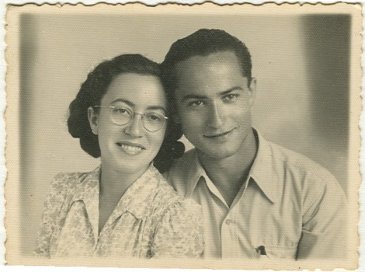
Erna and Marek Thee in July 1942. Photo: private archives
Her parents, however, were sent from Vienna to Litzmannstadt, which is Łódź in Poland today. Her father died of emaciation and is buried there. Erna’s mother and a younger brother were sent to Kulmhof an der Nehr, which is Chełmno in Poland today. This was an extermination camp, and Erna and her two siblings never saw their parents or their youngest brother again.
Marek Thee was concerned with improving human societies and had not given up his idealism. In 1952, he was removed from his consular posting in Israel by the Polish authorities, and returned to Warsaw to take up a post at the Ministry of Foreign Affairs there. This happened at the time of the Slánský-process in the then Czechoslovakia, where 13 members of the Communist Party, 11 of whom were Jews, were tried (and convicted, most to death sentences) on charges of a Trotskyite-Zionist conspiracy.
Not long before Marek moved to Poland in 1952, his daughter Halina was due to be born, and Marek asked his wife Erna to travel to Poland to ensure that Halina was born there. Erna, heavily pregnant, travelled to Poland, and gave birth in a military hospital in Warsaw. With origins from Vienna, an Austrian Jew, Erna spoke Austrian-German, as well as Hebrew, neither of which were of much help in post-war Poland. Reflecting on her mother’s experiences, Halina notes:
(Re)migration to Poland and launching an academic career (1952)
When arriving in Warsaw in 1952, Marek Thee got a position at the Polish Ministry of Foreign Affairs, but very soon he lost this job. Instead, he was sent to the Polish Institute of International Affairs in Warsaw (PISM, Polski Instytut Spraw Międzynarodowych). At this point, Marek was 34 years old. He had a diploma from upper secondary school in Gdańsk [Danzig] from before the Second World War, but beyond this, no formal higher education. He therefore spent the next years studying, as well as keeping a close eye on international affairs.
At first, he focused on the Middle East; however, he soon discovered that this was not a prudent subject when dealing with Polish authorities. Another regional focus would prove far more fruitful for Marek Thee professionally, as a diplomat and as an academic: Indochina.
Working in Vietnam and Laos (1955–1963)
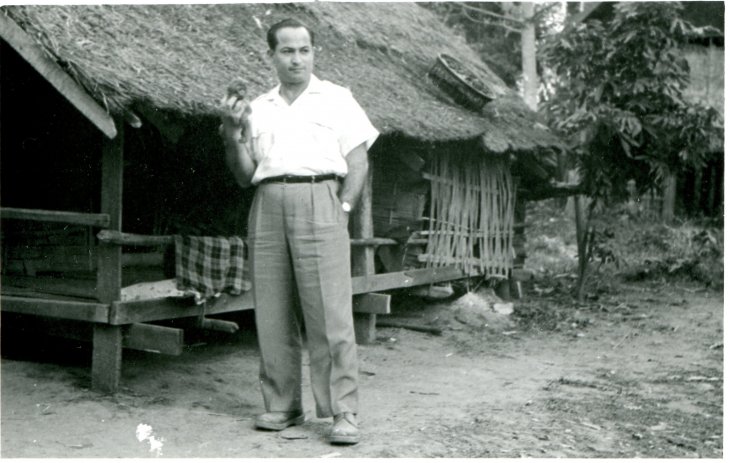
Marek Thee in Laos. Photo: private archives
In 1955, Marek Thee was sent as an adviser to the Polish delegation to the International Commission of Supervision and Control (ICCS) in Vietnam, following the 1954 Geneva Agreement. He was first based in the divided Vietnam, and later in Laos, whose independence and sovereignty had been recognised in the Geneva agreement and would be recognised once again in a new Geneva agreement in 1962.
His title was Commissioner, Polish representative (in the rank of the Minister Plenipotentiary) at the International Commission of Supervision and Control (ICCS). The Commission consisted of representatives from Canada, India and Poland. Its role was overseeing peace and peace-keeping in Indochina.
After a few years back in Warsaw, Marek Thee was again called to Laos in 1961, based on his significant knowledge of the region from past engagement. He stayed in Laos through 1963, only rarely travelling back to Warsaw to report to his superiors at the Ministry and to see his family. The circumstances under which he was posted were too dangerous for family visits. His daughter recalls:
As Polish Commissioner in the rank of the Minister Plenipotentiary, Marek Thee made many useful connections, several of whom he interacted with in various ways at different junctures later in life. Notably, this included princes and generals, all central players in relation to peace in Laos, Vietnam, and Cambodia at the time.
[Laos] wasn’t a ‘champagne’ kind of diplomatic posting, he was part of monitoring efforts in unstable circumstances […] one night, he came late to his room, and there he found only the fireplace and mantelpiece remaining. The room was gone [bombed].
Marek Thee shared his reflections and experiences with this work in the book Notes of a Witness: Laos and the Second Indochinese War (1973) as well as other publications, including the article ‘War and Peace in Indochina’ in the Journal of Peace Research (1973).
The final years at the Polish Institute of International Affairs (1963–1968)
From 1963 onward, Marek Thee was fully back at the Polish Institute of International Affairs, while his daughters were completing secondary education and university. After a few years of relative normality, after the Six-Day-War in 1967, things started changing.
While 1968 is an important year in European history, with multiple student protests, especially starting in Paris, as well as the events in Prague, the preamble to Polish events in 1968 – of a different and more sinister nature – was the staging of a play at the theatre “Teatr Narodowy” in 1967. On the occasion of the fiftieth anniversary of the October Revolution, a range of cultural events and performances were planned. Among these was the performance of the play “Dziady” (Forefathers’ Eve) by the poet and writer Adam Mickiewicz in Warsaw.
The chairman of the [Polish United Workers’] party gave a speech [… saying] that Zionists should leave. The word Jew was never mentioned. Just Zionist. […] My father understood fully where this was headed. […] So, [my parents] started going for these long, long walks in the park. Because our apartment, of course, and especially our phone, was tapped. Everyone knew this.
Following the performance, the Party organs were not very pleased, and rumours of a suppression of the play started spreading. This served to increase the play’s popularity and the emphasis on phrases and moments with anti-Russian potential, where the audience applauded and cheered. The Soviet ambassador is also rumoured to have influenced what happened. By mid-January 1968, the authorities decided that the play would be taken off. Following the last performance in January 1968, a student protest was organised in Warsaw, and some 35 people were detailed, though most of them were quickly released.
In March 1968, the Party [Polish United Workers’ Party] started a propaganda campaign in which they accused prominent people of Jewish origin (so-called Zionists) to have influenced the students. It was suggested that they were cooperating with anti-Polish forces abroad. This campaign was spread over the whole country, including in the Western part of Poland where many Jews had settled down after the war. As a result, most of the Jews still living in Poland at the time, who had survived the Holocaust or returned from the Soviet Union after the war, were forced – or encouraged – to emigrate to Israel. Where they went after crossing the Polish border was of no interest to the authorities as long as Israel formally was the goal. This campaign was mainly part of an internal power struggle within the Party, but anti-Semitic sentiments, as well as loyalty to and fear of the regime, made it possible on such a large scale.
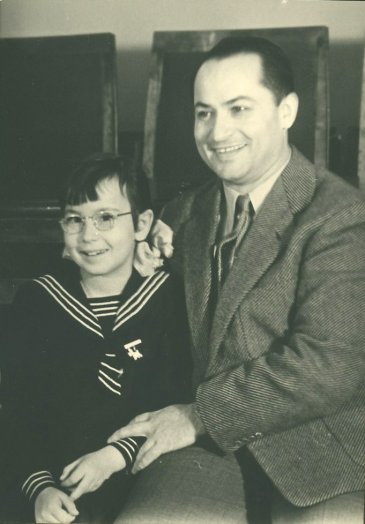
Marek Thee with Halina Thee at a Christmas celebration in 1960. Photo: private archives
We had to fill in name, address, citizenship and nationality. Not just citizenship. Both citizenship and nationality. I thought, what on earth, I’m Polish – I lived there
Leaving Poland (for Israel) and heading for Norway (1968)
In the course of 1968–1969, an estimated 15,000–25,000 people of Jewish background, mostly well-educated, left Poland on one-way papers for Israel.
They were stripped of their Polish citizenship and forced to leave behind property.
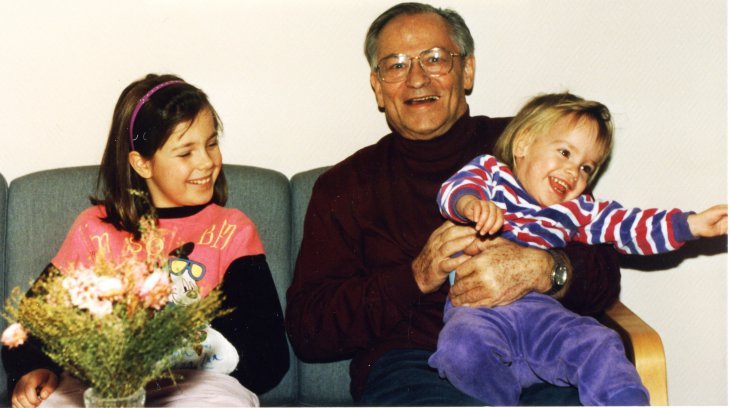
Marek Thee with his grandchildren in 1989. Photo: private archives
Becoming the Editor of the newly established Bulletin of Peace Proposals (1969–1989)
The story of Marek Thee’s arrival in Norway is also one PRIO’s founding Director, Johan Galtung, reflects willingly on:
In Marek Thee’s own words, the Bulletin of Peace Proposals had the overriding aim ‘to present systematically, to compare and discuss in the light of general peace theory various plans, proposals and ideas for justice, development and peace’ (Thee 1970: 3). In Bulletin of Peace Proposals 19(3/4) pp. 288–289 in 1988, Marek Thee writes on ‘Science and Technology for War and Peace: The Quest for Disarmament and Development’, a piece deemed typical of his scholarly contributions – and lines of argument. Below is an extract, concluding that a ‘change of direction’ is urgently needed, with the ‘common good of mankind’ as its chief concern:
‘The current sharp acceleration of the race in science-based military technology has an ominous significance above and beyond the danger of war. It has a profoundly evil impact on the human condition. The working of military technology has produced a triple wickedness: it fuels and aggravates the course of the arms race, it deranges the economic performance of industrialized countries, and it acts to sustain under- development in the Third World – with all the implications this triple thrust has for the world economy and the maintenance of peace.
We urgently need a change of direction. Science and technology must once again heed their civilizational mission: they should serve peace and not war; they should underpin disarmament and should work actively for the improvement of the human condition. Freeing science and technology from the malignant pursuit of means of destruction is a major universal human imperative.
It is thus of fundamental import that we devise measures to restrain military technology, so that we may move seriously to genuine disarmament and may buttress development. This may be a tall order, but unless a start is made, we may find ourselves ever more forcibly in the grip of escalating armaments and an explosive developmental gap on the North-South divide.
With enough rationality and political will, we can check the technological momentum of the arms race by introducing qualitative technological criteria into arms control and disarmament efforts. But more than this is required: we need careful planning of a phased orderly redeployment of resources from military R&D and armaments, and their conversion for civilian use. Further, we have to try to activate the large community of scientists and engineers currently employed in military R&D to resist their engagement in this domain on ethical and moral grounds. With conversion planning on the way, they should find satisfactory alternative employment in civilian R&D. Most of all, we have to make the workings of military R&D and its consequences more transparent, so as to mobilize public opinion. This we need to back the call to transcend the military-technological compulsion and to make science and technology serve the common good of mankind’.
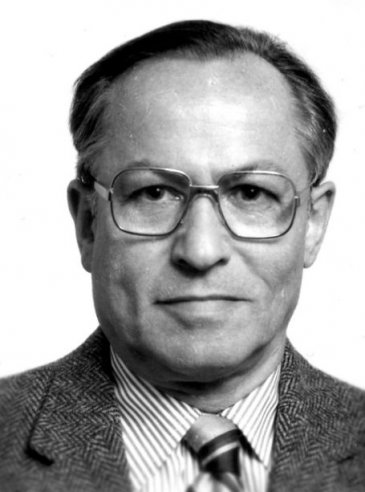
Marek Thee in 1990. Photo: private archives
On stepping down as Editor-in-Chief of Bulletin of Peace Proposals, Marek Thee took stock of the journal’s aims and achievements over nearly two decades. On the one hand, he was dismayed at the state of the world, and the prevalent focus on and funding for the military over and above the peace dimensions of international relations (in academic and real terms). On the other hand, he felt encouraged that, after all, readership, visibility, and attention for the cause of peace – and for prospects of peace proposals – had to an extent been possible to achieve:
‘Establishing the Bulletin of Peace Proposals as a scholarly, value-based and policy-oriented journal of peace research, my aim was to deepen and disseminate knowledge on the causes of conflict and war, and on conditions for the maximization of the values of peace. While keeping strictly to scholarly standards, I always tried to convey our critical assessments and findings in a readable style, to be readily understood by both the academic community and the readers at large: members of peace movements, politicians and students of international relations.
A distinct goal of the journal was to make more transparent the nature and dynamics of armaments and disarmament, of underdevelopment and development, of the struggle for human rights and for the betterment of the human condition, all so as to move public opinion and governments to genuine action for peaceful change. Did the Bulletin succeed in accomplishing these aims? Certainly not to the extent I had hoped; still, perhaps to some degree. Yet my dreams remain unfulfilled.
The imbalance in resources available for military research on the one hand and for peace research on the other is stupendous. The world is still in the midst of a fierce arms race; and the gap between the affluent and those suffering material and spiritual deprivation remains immense. All the same, it is a source of satisfaction that the Bulletin has won wide international acclaim among a concerned public and has established itself as one of the world’s leading peace research journals.
‘The imbalance in resources available for military research on the one hand and for peace research on the other is stupendous. The world is still in the midst of a fierce arms race; and the gap between the affluent and those suffering material and spiritual deprivation remains immense.’
This limited success is to a large extent due to the cooperation of the Editorial Committee and the editorial staff of the Norwegian University Press, as well as to the constant encouragement from our readers. Last but not least, the support of PRIO and its environment served as a stimulus for publishing the journal. Let me take this opportunity to convey my heartfelt thanks to all those who contributed to the accomplishments of the journal’.
A voluminous production on the possibilities for peace
Marek Thee’s scholarly contributions are summarised in terms of being a specialist of the arms race and international regulation and arms control. His diplomatic skills, however, were also continually put to use – for instance, in developing links and networks from PRIO internationally, whether with SIPRI (Sweden, Stockholm), or PRIF (Germany, Frankfurt), or elsewhere.
According to Marek Thee’s long-time friend and co-author, Asbjørn Eide (also a former PRIOite, PRIO Director, and later Director at the Norwegian Centre for Human Rights), as published in Thee’s obituary in Aftenposten in 1999:
‘He acquired in-depth knowledge of the arms race and its drivers, and of international negotiations on disarmament. He published books and articles, one after the other, mainly in English. Several were also translated into other languages. In his research, his main thesis was that perhaps the most important driver of modern forms of the arms race is the technological interest in exploring and developing new weapons, most recently “smart” weapons. He received a number of prizes for his research, from scientific milieus in countries as different as the US, South Korea, and Japan.’
As the below graph documenting the volume of his publications shows, Marek Thee was a prolific scholar. Meanwhile, as a scholar, his work is perhaps most accurately described as being based on his foreign policy interests and competence, as someone knowledgeable about and interested in the world, extremely well-read and very hard-working.
Among key titles in Marek Thee’s scholarship are Notes of a Witness: Laos and the Second Indochinese War (first published in 1973, with a total of 11 editions), Armaments and Disarmament in the Nuclear Age: A Handbook (first published in 1976, with a total of 25 editions published in 7 languages), and Military Technology, Military Strategy, and the Arms Race (first published in 1985, with a total of 14 editions published).
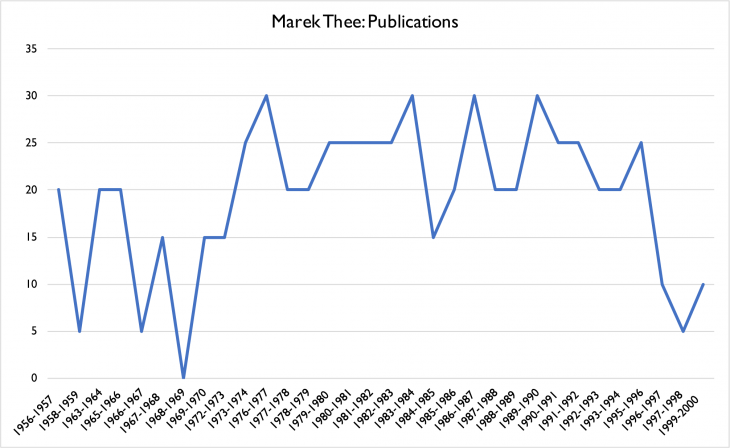
The graph summarises all of Marek Thee’s publications, across languages, types of publications, and editions of books, spanning the period from 1956 up until his death in 1999.
A lifelong dedication to a better future
Marek Thee was a diplomat and an activist as much as he was a scholar. His writing – and academic production – are testament to that scholarly dimension of his life. Yet, more than anything, Marek Thee was an idealist on a mission for a better future – for the world.
Having gotten his university education, only following a diplomatic comet career as a very young man in the immediate aftermath of the Second World War, Marek Thee juggled his diplomatic missions in Indochina with gaining professorship back in Warsaw. Unlikely as his twenty-year career at PRIO was – given his life history prior to the events of 1968, as a card-carrying member of the Polish United Workers’ Party, and a long-standing employee of the Polish Institute for International Affairs – Marek somehow did manage to find his feet at PRIO. This is reflected in his response to Johan Galtung’s question on his second day at PRIO in 1968 (as referred to above), and perhaps drew on his personal life history of uprooting and establishing new homes, over and over. For Marek Thee, PRIO was an opportunity sorely needed, at a critical juncture, as Stein Tønnesson (former PRIO Director, and supervisee of Marek Thee) reflects upon:
In retrospect, perhaps Marek Thee’s life history, so reflective of twentieth century history especially in Europe, was not always known to his colleagues at PRIO, in particular those who arrived at PRIO after him. Stein Tønnesson shares how he learnt about Marek Thee’s life story:
For PRIO researchers, alumni, and friends today, Marek Thee’s story can surely be an important memento and an inspiration – if it is more widely known.
Having turned 70 – retirement age – Marek Thee ended his relationship with PRIO. Despite his age, however, Marek Thee still had a dedication to his work for peace. Therefore, losing his workplace at PRIO was a heavy blow for Marek. His work was his life. Without an affiliation and an office to go to every day, he was lost. Especially after the death of Erna, when he was left in an empty house in Oslo. Asbjørn Eide understood this and gave him what he needed the most: an affiliation to the Norwegian Centre for Human Rights. Thanks to this affiliation Marek was able to produce, among other works, Peace! By the Nobel Peace Prize Laureates: An Anthology. He held his head high well past retirement age.
Concluding thoughts – by Marek Thee
In his unpublished memoirs My Story: a Journey Through the 20th Century, Marek Thee shares reflections that appear as pertinent in 2019 as when they were written twenty years ago:
‘I would very much like to conclude the reflections on my journey through the 20th century in a positive, hopeful mood. After all, greatly beneficial socio-political and economic-technological changes took place in the past century, such as the abolition of slavery, the elimination of colonialism, the rise of the human rights project, some advances in welfare, a curtailment in gender inequalities, the revolution in almost all sciences, hard-and soft-form, the explosion of information technology, expansion of transport, progression in medical sciences, physics, chemistry, microelectronics, and finally the spread of democratic ideas and greater openness in national and international affairs.
The advances are unquestionable. However, the deep structures of ‘peacelessness’ in military and socio-economic affairs prevailed. Lack of freedom from want and fear remain potent. The world is still dominated by old-style divisive politics, by ethnic-nationalist and religious conflicts, by armaments, militarisation of international relations and deep cleavages of a socio-economic and political nature.’
A postscript from the author
The story of Marek Thee’s life and work is a stark reminder of both the resilience and the vulnerability of human beings. More so, it is the unlikely story of a Polish-Jewish boy’s journey from Rzeszów to Oslo, with significant stops in Gdańsk [the Free City of Danzig], in Tel Aviv, Israel, and in Warsaw, Poland – interspersed with stays in Indochina, along the way.
It is the story of a son, a husband, and a father, of a man who found himself in snowy Oslo in late 1968, setting out on the final stretches of a long professional career that would still give him two decades as a PRIOite, before spending his last ten years working from the Norwegian Centre for Human Rights.
At the outset of the conversation I had with Marek Thee’s daughter, Halina, which constitutes the backbone of this text, she asked: ‘How much do you know about Poland, about Poland’s history in the twentieth century? Are you aware of the developments in Poland now, where they are re-writing history? Because, I’m going to tell you “the wrong version” of history’.
As far as re-writing Polish history goes, it is worth noting that Polish-Jewish history is actively being narrated, for instance in the Jewish cultural revival in Krakow, and through the exhibitions and educational engagement with school children at the POLIN museum in Warsaw.
But, simultaneously, anti-Semitism is again increasing in Poland, and history is indeed becoming increasingly politicised, making museums – such as POLIN – sites of struggle over narrations of the past. The history of the radically changed demography of Polish society – prior to as compared to after the Second World War, when the Polish-Jewish population was all but gone – is one that is omnipresent for all those who choose to see it. Yet, this history is often invisiblised and left tacit in present-day Poland. Much the same can be said for the events of 1968, leading to the last departure from Poland of Marek Thee and his family.
Meanwhile, the story of Marek Thee’s life, including his engagement with PRIO for two decades, underscores the importance of which stories we choose to tell – and, in turn, which stories we choose to forget. By choosing to tell – and to share – Marek Thee’s story, PRIO is choosing to foreground the story of a remarkable life, of an astounding character and human being. In doing so, PRIO also seeks to actively narrate a past that was not only idealist in its peace activism, but that was (or sought to be) international and welcoming to outsiders.
It is a story to be inspired by, and to be disturbed by – a reminder of the possibilities inherent in new beginnings, but also of the pervasive dangers of fragmenting fundamentalisms that Marek Thee himself warned us of at the outset of this piece.
Thank you for giving Marek Thees life story a place in history! A remarkable man, and one who has lived and understood so much of our common past and present. An important biography, one to remember.